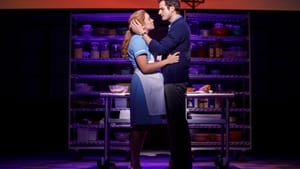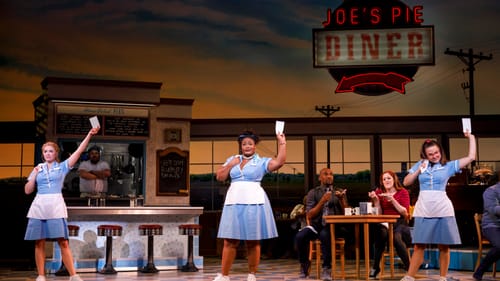Stay in the Loop
BSR publishes on a weekly schedule, with an email newsletter every Wednesday and Thursday morning. There’s no paywall, and subscribing is always free.
Check, please
Broadway Philadelphia presents 'Waitress'

Diabetics and dieters beware: sugar shock awaits at Waitress, the sickly-sweet hit musical that’s landed at the Forrest Theatre as part of Broadway Philadelphia’s subscription series. Singer-songwriter Sara Bareilles’s adaptation of Adrienne Shelly’s 2007 film captures neither the charm nor the grit of its source material.
As written by Shelly — whose tragic murder prior to the film’s release made national headlines — Waitress the movie explores the quiet desperation of an unhappily pregnant greasy-spoon server with wit and wryness. It doesn’t shy away from facing heavy subjects head-on, including domestic abuse, adultery, and the feeling that women should put the needs of men before their own desires. Although it has a happy ending, it steers into the skids along the way.
Missing links
Bareilles’s musicalization, written with librettist Jessie Nelson, only flirts with these tough themes. The frame remains the same: Jenna Hunterson (Desi Oakley), the title character, leads a dead-end life in a dusty Southern town. She’s trapped in an unfulfilling marriage to her high-school sweetheart, who’s turned violent and controlling. Her only respite comes in the form of the intricately detailed she bakes (with fantastical names like "Where There’s a Whisk There’s a Way Pie").
When she finds herself unexpectedly expecting, Jenna assumes any chance of transcending her miserable existence is gone. But she gradually finds comfort in the arms of Dr. Pomatter (Bryan Fenkart), her married gynecologist. Their relationship adds new complications to Jenna’s already fraught life.
This should be fertile ground for an engaging and thoroughly adult musical. But Bareilles and Nelson seem unwilling or unable to imbue their characters with perspectives that justify their motivations. Bareilles’s forgettable melodies and vacuous lyrics largely elide the serious issues underpinning the narrative.
Jenna plays as the most well-rounded figure onstage, but even she remains mostly two-dimensional. The writers hint that she grew up in an abusive home — a structure her own marriage mimics — but they never explicitly connect the dots. It’s a missed opportunity to examine generational cycles of abuse.
Lost focus
Waitress largely treats adultery as something done for comic effect. Granted, one wonders what Jenna could possibly see in Dr. Pomatter, a bumbling buffoon (amplified by Fenkart’s manic and unappealing performance). But neither character exhibits much self-awareness in their actions, and their affair remains little more than a plot device.

By contrast, the secondary character Becky (Charity Angél Dawson) offers a compelling rationale for her own infidelity in “I Didn’t Plan It,” the musical’s best song. A fellow waitress, Becky has a less-than-perfect marriage to an older, infirm man. She cares for her husband but must find emotional and sexual satisfaction elsewhere. “I don’t claim to be proud,” she sings, “but I won’t hang my head in shame.” It’s a rare and needed moment of self-actualization, but it’s coming from a minor figure.
The other supporting characters remain thinly drawn and mired in stereotypes. Bareilles and Nelson spend far too much time on the insignificant romance between quirky waitress Dawn (understudy Emily Koch) and her equally goofy boyfriend Ogie (Jeremy Morse). The importance of Jenna’s story gradually recedes, and although Oakley sings well, she lacks the needed presence to hold the stage.
In that respect, Diane Paulus’s puzzling direction provides little help. She populates the stage with whirling, distracting bodies that draw focus away from what are meant to be private moments (the frenetic choreography is by Lorin Latarro). Even when Jenna escapes to the kitchen to bake — her only solace — supernumeraries appear to hand her measuring cups and sacks of sugar. The onstage band routinely insert themselves into Scott Pask’s diner set, for no apparent reason.
Jenna only finds herself onstage alone during “She Used to Be Mine,” her anthemic 11-o’clock number. She sings of how self-denial can cause a person to wake up one day and not recognize her own reflection. It contains a sharpness most of the musical misses, but it also feels like too little too late. After so much sugar, you can barely taste the pinch of salt.
What, When, Where
Waitress. By Sara Bareilles and Jessie Nelson, after a screenplay by Adrienne Shelley; Diane Paulus directed. Broadway Philadelphia. Through February 18, 2018, at the Forrest Theatre, 1114 Walnut Street, Philadelphia. (800) 872-8997 or telecharge.com.
Sign up for our newsletter
All of the week's new articles, all in one place. Sign up for the free weekly BSR newsletters, and don't miss a conversation.

 Cameron Kelsall
Cameron Kelsall